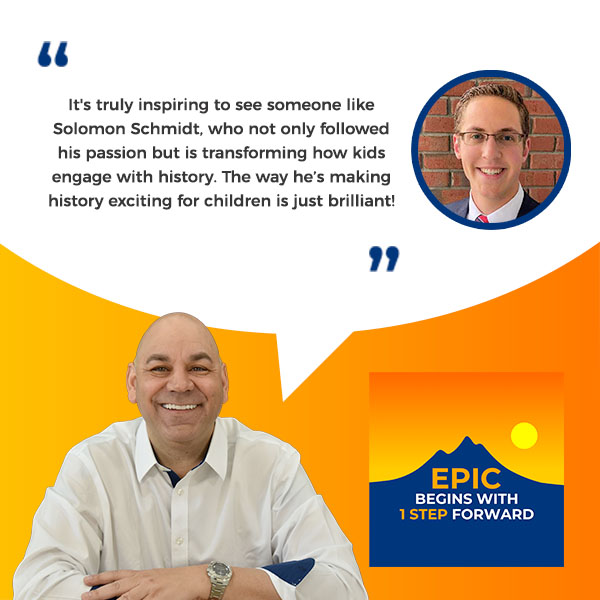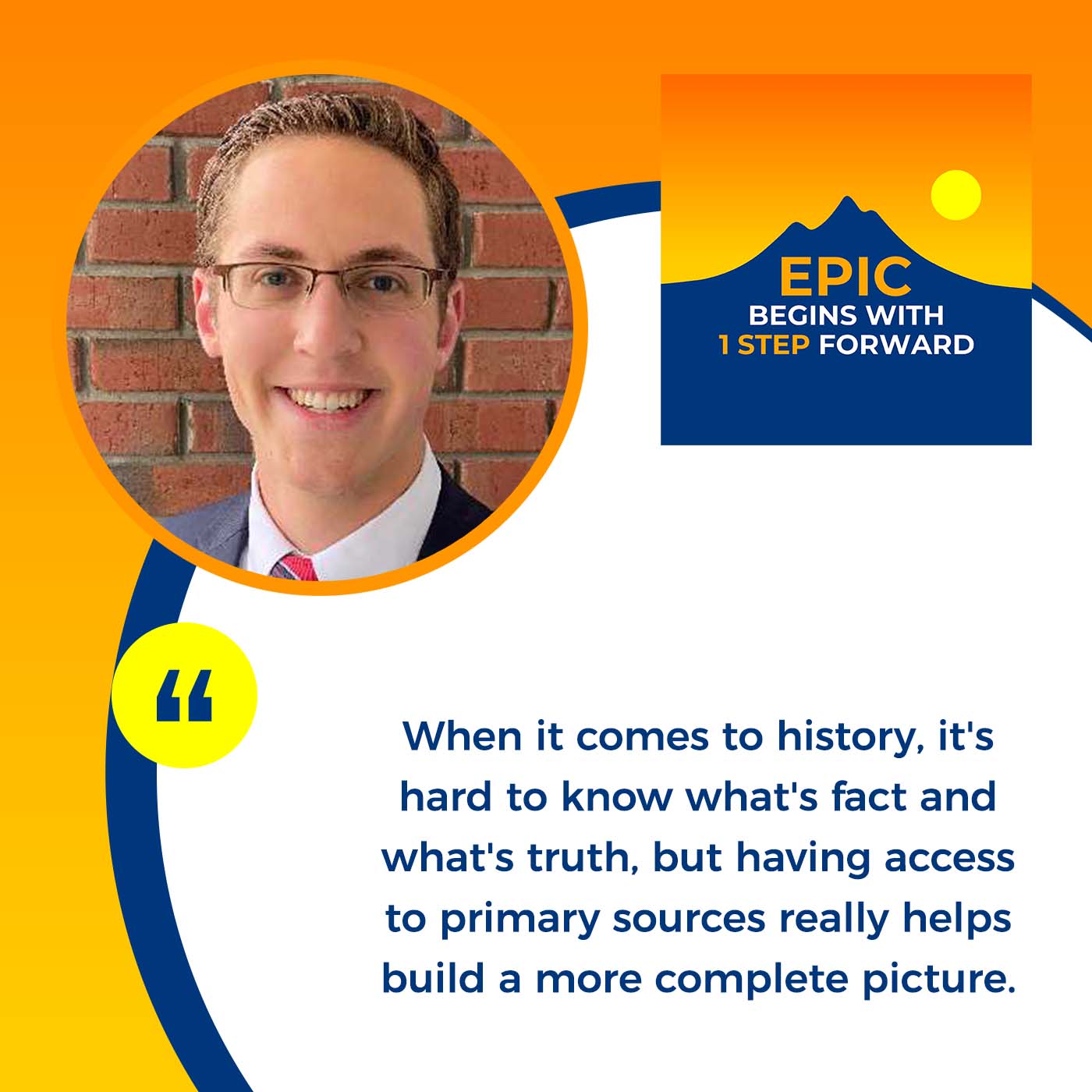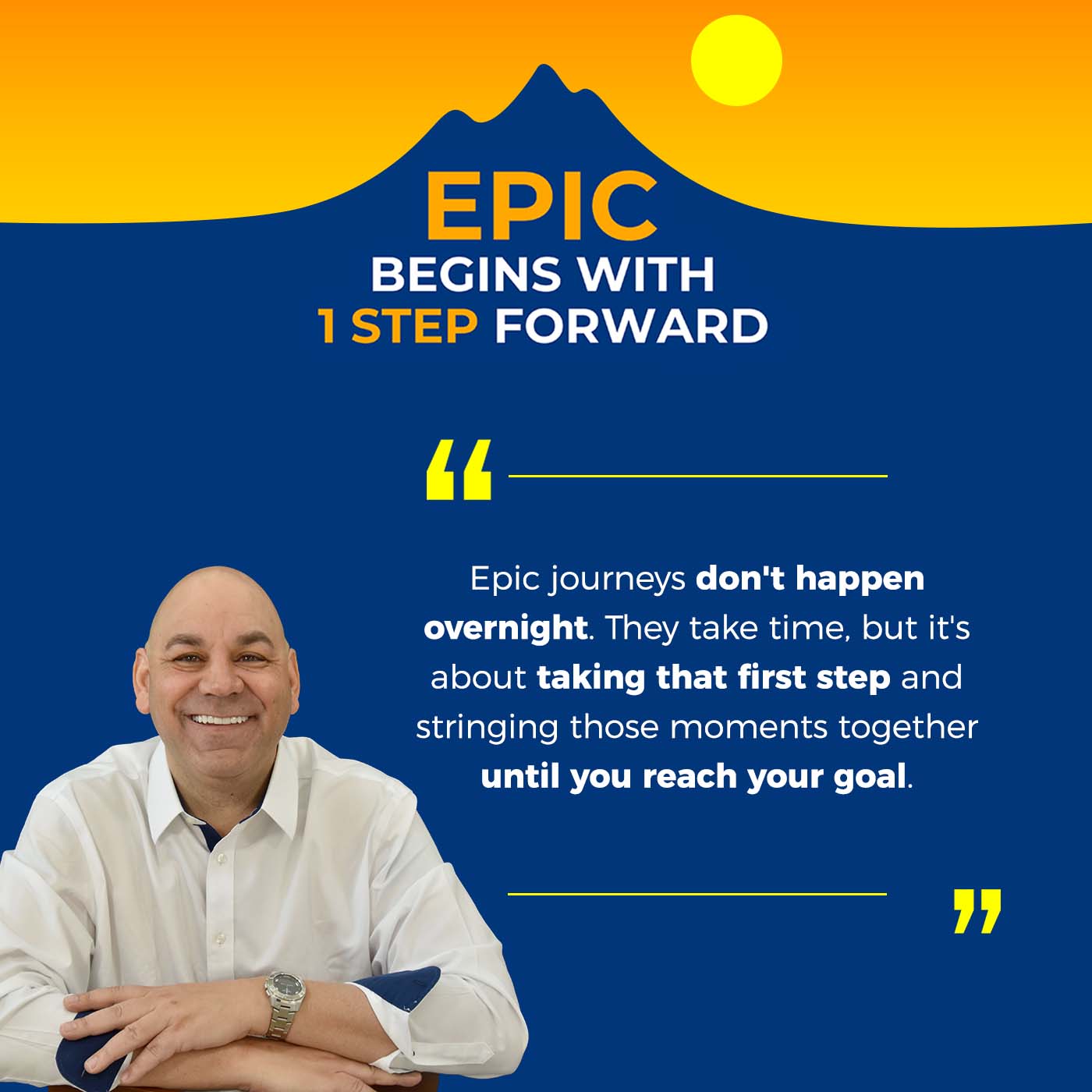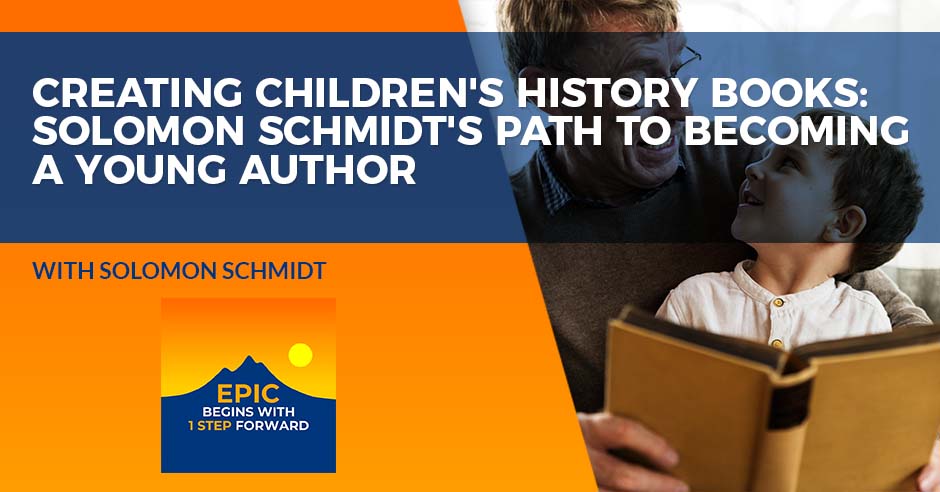—
Watch the episode here
Listen to the podcast here
Creating Children’s History Books: Solomon Schmidt’s Path To Becoming A Young Author
Welcome back to another exciting episode. I am joined by Solomon Schmidt. Solomon, tell us a little about who you are and what you do.
Introduction To Solomon Schmidt And His Journey
Thanks for having me on, Zander. I have written a series of books called U.S. History Bites, which I started when I was twelve, and I was never into sports, really. I was not good at sports. I was nerdy with how much I loved history, and my dad gave me the idea to write a book for kids my age that would help kids get excited about US history. My mom was always giving me books from the time I was a little kid, and so I created this series called U.S. History Bites with chapters that are bite-sized, so 3 to 4 pages on George Washington, World War II, whatever the topic may be.
I go through hundreds of people and events in the US and world history with pictures, fun facts, bobblehead illustrations of myself, review questions, and other things to make it fun and engaging for kids. I also have a YouTube channel called History Bites, which ties in with the books, and I’ve done about 150 videos and interviews on the channel so far. This prompted our meeting, Zander. I completed a biography on Alan Dershowitz, a very famous attorney. I know it’s a bit of a switch from History Bites to Alan Dershowitz, but there you are.
Trust me, we all have things where there’s a bit of a shift, but it’s where the passion goes. I do have to say, I love the idea of History Bites. Aside from being a Psychology major in undergrad, I was also a History major. I find history fascinating. I grew up in New England, so I grew up surrounded by all kinds of American history, and I think that there’s so much fascinating stuff that’s happened, and people just don’t know about it.
You talk about New England. I’ve been reading a biography on John Adams by David McCullough, who is one of our great historians. He passed away. The story of our founding fathers and mothers is just sensationally interesting. When it comes to Dershowitz and my biography on him, I see him in some ways as a direct descendant of founding fathers like John Adams. You may remember John Adams was a lawyer and received all sorts of flack for taking on the case of defending the British soldiers in the Boston Massacre trial who killed colonists. John Adams was on the side of the colonists in the struggle between Britain and the American colonies.

People gave him pushback over representing the British soldiers in this trial. He said that if we really believed in the concept of equal justice for all people, that applies to the British soldiers as much as to the colonists. He knew it was going to cost him in reputation and career opportunities. He believed it was the right thing and did it anyway. That’s Dershowitz to a T.
That is part of what makes our country great, we really do have equal opportunity to be defended. When you’ve been accused of something, you have just as much of a right to have someone defend you. If the prosecution doesn’t do their job, then you get found innocent. I know this personally because, for about fifteen years, my dad was a district court judge in Massachusetts. At many dinners, we would talk about some of the cases that he had adjudicated.
I got to go see him in court, and there were somewhere, I’m sitting there going, “There seems to be evidence that this person did what they’re accused of,” perhaps excessive speed or driving under the influence, none of which I’m advocating at all, the prosecution simply doesn’t present a case that’s good enough. That person’s acquitted. You may go, “I don’t think that’s right.” That is the way our system works.
That’s right.
One thing that was interesting. When I was in college, I went over to Australia to study Australian history. I studied settler history and Aboriginal history. Very fascinating, let me tell you. I learned a lot. What I learned about Aboriginal history is that there’s a people that’s 60,000 years old. It’s an oral history. Since I’m not Aboriginal, I can’t actually really, I can’t know it because I’m not Aboriginal.
I can hear about it. Everything I read was actually a missionary writing down what one person told them. What we know about history also, I assume, Solomon, is that we sometimes have to question, I think, what we read. We read and go, oh, that’s the way it happened. You and I could witness the same exact thing and have different takes about what happened. I learned a lot about believing, but also questioning, “Is that the way it happened?” The Boston Massacre you were talking about. We have one account. Maybe there was the account from the English side that says, “The colonists were hurling rocks at them.” I don’t know. I’m just saying that’s interesting.
The Importance Of Accessing Primary Sources For Biography Writing
It is. It’s hard, Zander, when it comes to history and when you talk about facts, what is fact, what is truth? One of the things that I was really lucky with in my book Legal Gladiator: The Life of Alan Dershowitz on Dershowitz was that I had access to primary resources, Dershowitz, his friends, his family, his colleagues, his clients. I interviewed a lot of prominent people in our nation, Justice Breyer, Stephen Breyer, President Trump, Mike Tyson, Woody Allen, Robert Kennedy Jr., so many people.
Equal justice means defending everyone, no matter the cost. John Adams knew it, and so does Alan Dershowitz.
When you get access to primary resources, in addition to interviews, I also looked through Alan Dershowitz’s personal archives at Brooklyn College, where he has hundreds of thousands of documents from his legal career and his career as a professor at Harvard Law School for 50 years, legal memos, letters, diaries, newspaper clippings, photographs.
It helps you build a more complete picture, helps you be able to decide on some issues with reasonable certainty, what we can trust is true or factual. Where facts were disputed, I just tried to give both sides of an account. For example, one of Dershowitz’s greatest intellectual opponents is Noam Chomsky, a prominent left-wing activist and retired professor from MIT. He and Dershowitz have had many vehement disagreements over the Israel-Palestine controversy.

In that situation, history is very much disputed. When it came to their debates, I quoted both of them, and I leave it to readers to figure out who they wanted to believe. If readers want to go off and do their own investigation, that’s great. One of the things I enjoy about reading and writing is that hopefully you inspire people to start their own epic journey, as you might say.
The question I have for you is, how did you come up with the idea to write a biography about Alan Dershowitz? Very impressively, how did you access all these primary sources? I’m guessing most of the people you named, it’s impressive, but it’s not like you necessarily just pick up the phone and say, “Mike Tyson, I’d like to talk to you,” right? He’s got people.
The Process Of Writing A Full-Length Biography
With the first question, Zander, I had written eight books in my series U.S. History Bites by 2021, and I was looking for a change of pace. I’ve written two kids’ biographies on J.R.R. Tolkien and C.S. Lewis, but I was always interested in the idea of doing a full-length biography on someone living and hopefully interviewing them. I came across the work of Professor Dershowitz, particularly him as a constitutional scholar, and I began researching his life a bit and realized that he’s got a fascinating career, a fascinating story. When you take his career, he’s done around 300 legal cases, including Mike Tyson’s case in the ‘90s, OJ Simpson, Jim Bakker’s case, the televangelist and other cases, Jeffrey Epstein, President Trump’s impeachment trial. Some of these are just horrible stories but fascinating from a legal standpoint. You’ve got his legal career, then you’ve got Dershowitz as a 50-year professor at Harvard Law School, the youngest in Harvard’s history.
Don’t be afraid of change. Sometimes you just need to try something new to discover a new passion.
He was tenured at 27 in 1967. He taught 10,000 students, including Ted Cruz, Elena Kagan, Natalie Portman, Jamie Raskin, and many others. He’s a best-selling author and speaker. He has sold 2 million books in a dozen languages. He’s written 55 books. He has spoken in person to 2 million people. He’s addressed the House of Lords, the Senate, the Knesset, and the French Parliament. He’s spoken in the Sydney Opera House, etc.
You’ve also got his career as a Zionist, which is very controversial, I understand. He has been one of the most prominent advocates for Israel on the world stage and is a close friend of Benjamin Netanyahu and other Israeli leaders. You’ve got that side of his story. He’s also got an amazing human story. A couple of questions that drove me on in my research, one was, how does a kid who is a punk in his community, mothers told their daughters in his neighborhood, “Don’t associate with Avi Dershowitz.” That was his nickname, Avi, A-V-I.
He’s a boy with no future. That’s what one mother said. Terrible grades in school, faked his own suicide in school, was a terribly behaved kid, and was a loudmouth. How does that kid, just this punk, a kid who everyone expected to be a loser, end up 60 years later, whatever it was, 60-odd years later, standing on the floor of the Senate in a presidential impeachment trial, representing the President of the United States? As he’s standing on the floor of the Senate with the Chief Justice behind him and our nation’s leaders in front of him, some of the faces he’s looking out at are senators who sat at his feet at Harvard Law School. That was one question.
Another question that drove me on was, why does a man who is a member of the Democratic Party—and still, and always has held basic Democratic political beliefs, anti-death penalty, pro-choice, pro-reasonable gun control, and other positions, a New Deal Democrat, why does that guy defend President Trump, and most importantly, knowing he’s going to be canceled for it? That is what got me onto Dershowitz.
I was introduced to him by a civil liberties lawyer in Boston named Harvey Silverglate, who was one of the first people I reached out to when I was first starting to research Dershowitz’s life. It turns out Harvey has known Dershowitz for 60 years and is basically his only friend, a Democrat who supported Dershowitz through his representation of President Trump. I hit the jackpot because Alan trusted Harvey, and Harvey is a confidant of Alan. When Harvey went to Dershowitz and said, “Hey, there’s this kid who wants to write a biography on you, and he’s hoping to get in touch with you,” that meant something to Dershowitz.
I met him, told him what my proposal was for the biography, and he was enthusiastic about it. He helped me over the last few years get in touch with some of the prominent people I mentioned earlier. I’m just so grateful to him for giving a chance to an eighteen-year-old. It was a really special thing he did, and I’m just very grateful to him.
One of the things that I like to talk about in my book is I think we have epic things that we want to do. Clearly, you saw an epic journey you wanted to go on, which is to write this book about Alan Dershowitz, and it certainly sounds like it was really epic. Many people talk, “I’d like to write a book. I’d like to run a marathon. I’d like to do something.” They talk about it, but they don’t actually do anything. I’m all about, okay, why? Let’s get going.
Along the way, I think there are things that we want to do, but they take time. The two words that I think are so powerful are “not yet.” Both you and I, I’ve written as many books as you. We’ve both written multiple books. People will say, “Solomon, is your book out?” You have two answers. One, no, and that just stops the conversation, makes it sound like it will never happen. You obviously say, “Not yet.” It means it’s in progress. My question for you is, what are one or two of your not yets? What are things that you are like, “I really want to do this,” but you either haven’t started it or it’s just a longer process to get to it?
There is a project I’m working on, which is fairly long, and I have begun it. I’m currently working on a biography of JK Rowling, the Harry Potter author. It is called A Pen to Change the World: The Life of J.K Rowling. Not to shamelessly self-promote, but it is already up for purchase for pre-order and is hopefully going to be out next year. Zander, with writing books, it’s just a long haul. I understand I’m in a unique position in my life.
Lessons Learned From Self-Publishing
I still live at home. I have parents who can financially support me in my endeavors. I understand that writing a book is not always practical for people. The good news is we have this wonderful thing called self-publishing, which I have taken advantage of many times. My entire U.S. History Bites series is self-published. I have many older, younger, and in-between friends who have book ideas, have punched them out, finished them, and can actually get a finished product, and can hold their book in their hands.
It’s so hard to get published, but self-publishing is such a great route for folks to take nowadays because, for people like me, I wrote my first book when I was twelve, and I was able to get a physical copy of it. When you go through, I don’t work for them, but when you go through Kindle Direct Publishing, you can order 10, 50, 100, whatever suits your budget or suits your fancy.
I would encourage any folks who may be listening to explore that route if you’re interested in writing a book because it can be done. You can hold your book in your hands, and you don’t have to go through the red tape and the black hole of a publisher. Even people like JK Rowling, she got lucky, and she knows that.
Self-publishing gives you control over your work. Hold your book in your hands without the hassle!
Obviously, she wrote the best-selling book series in history, but it took, I think, around eleven different publishers before an assistant to an assistant noticed it accidentally one day and then took it to her publisher. Obviously, we’d all like to be JK Rowling, but we don’t want to have to go through the hassle of being rejected if we can avoid it.
You’re absolutely right that our ability to self-publish has opened up. There are so many more books available for people to read. There are absolutely 1,000 great books that have been published, and people get to find and read, but they’re not coming out from publishers that we all know, Houghton Mifflin.
Simon & Schuster.
There are two things to the whole self-publishing route. One, you have control of your book. It isn’t like you wrote something, and the editor is like, “No, I don’t like that,” and they change it. Also, you’re like, “No, you just changed what I intended. I wrote it that way because I want it that way.” Obviously, we write stuff, and hopefully, we have people who help us tighten it up and make it sound better and stuff, but without losing the essence of what you’re trying to say.
You’re right, it is super cool to hold your own book in your hand, be able to show it to people, and say, “Yes, here’s my book.” Funny thing about being a published author, Solomon, somehow we become better speakers. It’s got nothing to do with my oratory skills, but because I’m a published author, you’re a published author. If people ask us, “He’s published 8 or 12 books,” it gives us some legitimacy, some authority, which I sometimes find funny because it’s like, it doesn’t make you a better speaker, but somehow you are.
You’re expected to be.
Exactly.
By the way, my publisher might be upset with what I said earlier. I’m just kidding. My publisher is great. Zander, if I could comment on one thing you mentioned earlier, too, I would only comment on it because I’ve thought about it a lot, and I feel very passionate about it. Jesus tells us, “Don’t take the speck out of your brother’s eye when you have a log in your own eye.” I’m careful about giving out advice. One thing I would say, though, when it comes to “I haven’t done it yet,” is that at some point, we simply have to pick ourselves up and do it. I don’t work for Nike, but it’s the Nike slogan, just do it. At some level, emotion aside, feelings be darned. Get it done. Grind. Finish.
The whole not yet is more about the fact that I haven’t finished, not that I haven’t started. The example I’d like to use is, if you’re a freshman in college, people aren’t coming up and going, “Do you have your degree yet?” We understand that there’s a process. You don’t enter law school, and in the first week, someone goes, “So, are you taking the bar?” No, we understand. Yet in the wider part of life, where we spend most of our time in the world, people are quick to say, “No, I haven’t done that.” They may be on the path. They are doing it.
They are just doing it. Just like you said, I absolutely encourage people to take that first step forward. Get on that journey. You don’t know how long it’s going to take sometimes. I ran marathons. People said, “Have you run your marathon?” Not yet. That’s because my marathon might be in January, and it’s not January yet. It’s not time for me to run my marathon. No, I haven’t run it yet because it hasn’t happened. I’m on the way to it, but it’s just not the time for me to do it.
There’s a phrase I love from Bill Belichick, the former coach of the New England Patriots.
World champion Patriots, but that’s okay.
Bill Belichick’s Influence On Stringing Success Together
That’s right. I am from Buffalo, and I committed the great sin of rooting for the Patriots for many years. I say Belichick’s name knowing there might be some boos from people listening. However, he does have a great quote. I love it. Many great quotes. One of the quotes he gives is he talked about the season leading up to the Super Bowl.
When you’re tackling something as big as trying to win a Super Bowl or whatever your task may be, you keep stringing them together, keep stringing them together. Meaning, you focus on the game in front of you. Not the game from yesterday, not the game tomorrow, get today’s mission done, and then accomplish tomorrow’s. You do that enough, and you succeed enough, and you end up at the Super Bowl. If you don’t string them together, obviously, you don’t. I love that quote, “Keep stringing them together.” The do your job mentality.

In writing a book, you sit down and you’re like, I’m working on this chapter. I know I’m going to be writing these other chapters, but you’ve got to write what’s in front of you. That’s what you’re working on today, this week, this month, whatever. On your epic journey, we understand the road that we’re going down, but we’ve got to deal with what’s right in front of us. When I ran my marathons, I had to deal with mile five because that’s where I was. I could think about mile 20 or 24, but I’m not there yet. I had the pleasure of running the Boston Marathon in 2014, and it was great.
One of the bad things I can say was, having grown up in the suburbs of Boston and then lived in various places, from mile five on, I knew the whole entire course, and I had all kinds of nightmares about making a wrong turn and having to run an extra six miles and stuff like that. Even as I was running through Natick and knew the hills in Wellesley were coming, I had to deal with the road in Natick, not Wellesley. I knew it was coming, but I wasn’t on those hills yet, so that’s not what was in front of me.
Whether you’re writing a book or running a marathon, focus on what’s in front of you. One step at a time!
How To Reach Solomon Schmidt
You’re right. Just like Bill Belichick said, the game this week, here’s what we’ve got to do. Yes, we have an eye on the prize. I couldn’t agree more. Solomon, I want to thank you so much. This has been so fascinating. What you’ve accomplished so far is incredible. Your book on JK Rowling sounds like it’s going to be absolutely fascinating. I know I enjoyed her series of books, so I look forward to when that comes out. Just quickly, if people want to get a hold of you, how do they get a hold of you?
SolomonSchmidt.com. Thanks for what you said, Zander, and congratulations on your books and your very impressive website and podcast series you’ve created. I love the title Epic Journey. Thanks for having me on. It’s a pleasure to be with you.
Not a problem. I want to thank everyone for listening. If you want more information or you want to begin your epic journey, go to EpicBegins.com. As always, I want to remind everyone that epic choices lead to the epic life that you want.
Important Links
- Solomon Schmidt
- U.S. History Bites
- John Adams
- Legal Gladiator: The Life of Alan Dershowitz
- A Pen to Change the World: The Life of J.K Rowling
About Solomon Schmidt
 Solomon Schmidt is the author of eight books in a series called History Bites. He wrote his first book at the age of 12, graduated high school at the age of 16, and was described by Fox & Friends as “the youngest child historian in America.” In addition to running historical tours in England and Scotland,
Solomon Schmidt is the author of eight books in a series called History Bites. He wrote his first book at the age of 12, graduated high school at the age of 16, and was described by Fox & Friends as “the youngest child historian in America.” In addition to running historical tours in England and Scotland,
Schmidt hosts the History Bites YouTube channel, where he has posted over 150 educational videos and interviews, including with Jocko Willink, Gov. Mike Huckabee, Alan Dershowitz, Mike Tyson and Dame Jane Goodall.
Schmidt has traveled to Tanzania, Norway, Iceland, Greenland, Jordan, Australia and New Zealand to film videos for his channel and has given lectures at nearly 50 conferences throughout the United States. He is also working to help expand education in rural parts of Nepal through the JAPA Workbook Initiative. He lives in Buffalo, New York.

